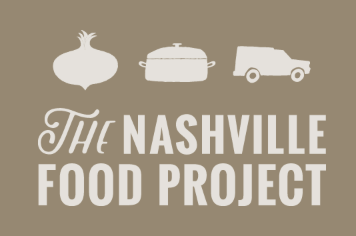Project Spotlight: The Nashville Food Project
Written by Alyssa Reynolds
The Nashville Community Food Hub Network (NCFHN), led by The Nashville Food Project (TNFP) in partnership with Cosecha Community Development and Brooklyn Heights Community Garden, is working to reduce food insecurity and build community self-reliance in North and South Nashville. Leveraging USDA funding to strengthen the existing capacity of these three organizations to feed and provide nutrition education to more Nashvillians.
NCFHN increases food security and food access and fosters community self-reliance through education and food distribution. The project is creating neighborhood-based food hubs that increase access to fresh, locally grown produce through pay-what-you-can markets and produce pick-up events. Beyond food access, the initiative empowers residents through hands-on education in gardening and nutrition, offering both workshops and hands-on community work days.
As a part of this grant, The Nashville Food Project launched the Growing Together Farmers Market in South Nashville earlier this year. This market was developed to increase access to fresh, locally grown produce in one of Nashville's low-income, low food access areas. It also creates new market pathways for a community of refugee farmers from Burma and Bhutan who grow vegetables in Nashville and would otherwise likely be unable to sell at local farmers markets due to language barriers.
Our Approach
Elevate has partnered with The Nashville Food Project (TNFP) to design and implement a three-year evaluation of the Nashville Community Food Hub Network (NCFHN). Our starting point was the grant narrative submitted by TNFP to their funder, which included a clear outline of intended activities and anticipated outcomes. This gave us a strong foundation to begin crafting an evaluation approach that was both grounded and flexible.
Using the grant materials, we developed a Theory of Change and a Logic Model, which we then workshopped with the NCFHN team. Together, we clarified the core activities of the grant and aligned on shared goals. From there, we moved into the design of our data collection strategy, working collaboratively to determine who our key audiences were and what we most wanted to understand about the program’s impact on each of them. With a diverse group of partners and participants, we were intentional about designing tools that would gather meaningful data without placing undue burden on those involved.
Now in the middle of the growing season and year one of the evaluation, we’re already seeing just how dynamic this work truly is. Programming has evolved, strategies have shifted, and some original plans have been reimagined in response to real-time learning and community needs. As these changes unfold, we’ve adapted the evaluation right alongside them, ensuring our methods stay aligned with the program’s direction and remain useful to those doing the work.
This kind of flexibility isn’t just expected—it’s essential. Community-based initiatives are inherently responsive, and it's both natural and necessary for programming to evolve over time. Evaluation should be no different. A strong evaluation isn’t static; it’s a living process that supports learning, growth, and impact. We’re excited to continue this iterative journey with TNFP and look forward to what the next season brings.
“As we’ve launched the Growing Together Market at TNFP, Elevate’s support has been essential in helping us set up survey tools and project monitoring processes and protocol to successfully track community impact and customer engagement. ”


